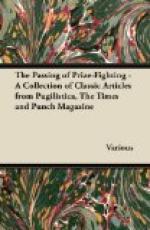Scottish Paper
She would probably be quite effective at ordinary ranges.
***
“Would the Party who
removed Petticoat from the Railway Fence,
between 11th and 12th, kindly
return same and save further
exposure.”—Provincial
Paper.
In the interests of propriety we trust this appeal has been responded to.
* * * * *
Another historic interview.
By our special correspondent.
Incited to great efforts by the interview in “The Times” with President WILSON, wherein so much is said (by the interviewer), Mr. Punch sent forth one of his most energetic and Napoleonic young men to attempt a similarly incredible feat and obtain an interview with that most unapproachable of men—President not excluded—the Editor of “The Times.” The word “failure” being absent from the Bouverie Street lexicon, it follows that the impossible was achieved, and the electrifying result is printed below. In the wish that readers in vaster numbers than usual may peruse the winged words of the illustrious journalist, Mr. Punch offers the freedom of the article to all editors the world over.
The office of The Times is situated in a busy quarter of the great city of London and is built of brick and stone. Light enters the numerous rooms through windows made of glass. Outside is the roar of traffic; inside, the presses groan, not always without reason.
My appointment with the august and retiring controller of the great English journal—the Jupiter who directs its thunderbolts, determines the size of type appropriate to every correspondent, and latterly has added to the gaiety of nations by offering a tilting-space to the attorney-general and Mr. Gibson Bowles—my appointment being at three o’clock I was careful to reach the office a few minutes before that hour, because I like to have time to look around and collect those little details of environment and atmosphere which are so valuable in themselves as to make it almost immaterial whether the person I am to interview speaks at all.
Entering the offices, which can be described only as palatial, I was struck by the thoughtfulness—no doubt appertaining to the head of the establishment who was so soon, for the first time in history, to grant me an audience—which had provided a parallelogram of some fibrous material for the purpose of removing the mud from one’s boots. A minute later I was again delighted by the discovery of an ingenious contrivance in the shape of a kind of peg or hook on which a hat and coat could be placed. It is by just such minutiae as these that one place is distinguished from another and character indicated.




